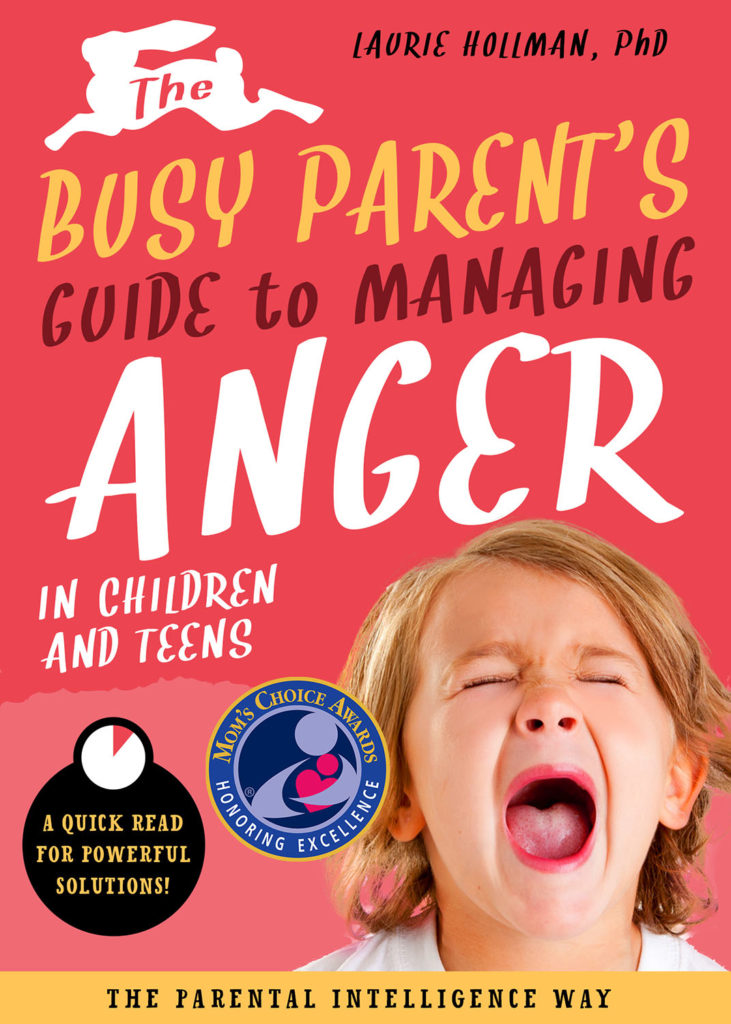The Busy Parent’s Guide to Managing Anger in Children and Teens
 Buy the Book: Amazon, Barnes & Noble
Buy the Book: Amazon, Barnes & NobleTitle: The Busy Parent's Guide to Managing Anger in Children and Teens: The Parental Intelligence Way
Published by: Familius
Release Date: August 1, 2018
Pages: 112
ISBN13: 978-1641700115
Busy Parent Guides: Quick Reads for Powerful Solutions
OVERVIEW
Do you have an angry child? “Do you wonder why your child or teen seems on edge, unduly angry, and restless at times—or maybe all the time? Are you uncertain if and when you should be worried? Are you so busy that sometimes you dismiss these thoughts but later reconsider them? You may be noticing you have a frequently angry child or teen.” (excerpt from Introduction)
In this book, healthy expressions of anger are discussed, as well as, when kids repeatedly say “No,” experience temper tantrums, and have angry reactions in interpersonal situations. The book illustrates how parents help children and teens master these feelings the Parental Intelligence Way.
The five steps to Parental Intelligence are explained with multiple examples of how busy parents use them to help angry kids solve problems. Parenting tips are elaborated in this quick read that offers powerful solutions for both ordinary and complex angry interactions. The audio is read by actor, Rich Hollman, son of the author, who was raised The Parental Intelligence Way.
ENDORSEMENTS
Gold Mom’s Choice Awards Winner
“Dr. Hollman has transformed her many years of clinical experience and study into an immensely useful guide for parents and clinicians to help children and parents develop stronger familial relationships and relieve the stress and anger that may develop at different stages of childhood.”
—Ernest Kovacs, M.D., F.A.P.A., Diplomate American Board Psychiatry and Neurology; Clinical Professor of Albert Einstein College of Medicine; Supervisor Family and Marital Therapy Zucker Hillside Psychiatric Residence Program
“This book incorporates psychodynamic principles and practical wisdom for learning from our children and adolescent’s angry experiences. Parents can learn new approaches at problem solving, from the perspective of child and family development, and meaning-making. It’s like having Dr. Hollman as a live-in psychological expert child-minder. Read the book twice!”
—Carl Bagnini, LCSW, BCD, Senior faculty, International Psychotherapy Institute, Washington, DC and Long Island, NY teaching child and family therapy, couple therapy and psychoanalytic supervision
“This new book is a superb follow up which provides a short, practical guide for parents struggling to manage their child or teen’s angry behavior. Dr. Hollman summarizes the Parental Intelligence principles and gives insightful real-world examples of the principles in action with angry children. The book is a quick, easy read which offers real help for managing different kinds of anger in children and teens. Highly recommended.”
—Janet Wilde Astington, Ph.D., Professor Emeritus. Institute of Child Study, Department of Human Development and Applied Psychology, University of Toronto; Editor, Minds in the Making
"This book will appeal to all parents committed to raising their children into thoughtful and emotionally intelligent adults and future parents. Highly recommended for educators, policy makers, and therapists, as well."
—Lynn Seskin, Psy.D., Clinical and School Psychologist
“Children’s anger is a significant challenge for parents to deal with. Dr. Laurie Hollman’s book provides parents with an insightful approach to responding to their children’s anger through understanding their children’s actions as well as reflecting on their own reactions. She illustrates her approach with clear examples of working out problems with children. This book should enable parents to help their children deal with anger and enjoy their children even more.”
—Jeremy Carpendale, Ph.D., Professor of Developmental Psychology, Department of Psychology, Simon Fraser University, Burnaby, BC V5A 1S6 Canada
INSPIRATION
I have been inspired to write this book after 30 years as a psychoanalyst working with mother and fathers questioning how to help their angry kids. They were searching for that special intelligence needed for such parenting, even though they didn’t quite know how to ask for it. I coined the term PARENTAL INTELLIGENCE to help them understand there was meaning underlying their kids’ anger and it was their job with the Parental Intelligence skill set I would give them to decipher that meaning and help their children and teens master their anxiety.
After my first book came out, Unlocking Parental Intelligence: Finding Meaning in Your Child’s Behavior, parents and professionals requested that I write short practical books applying this approach for busy parents. This new enlightening perspective for parents to become Meaning Makers has now become such a relief to parents and their kids. It not only relieves angry reactions but strengthens the parent-child bond.
EXCERPTS
Introduction
“Do you wonder why your child feels edge, unduly angry, and restless at times—ormaybe all the time? Are you uncertain if and when you should be worried? Are you so busy that sometimes you dismiss these thoughts but later reconsider them? You may be noticing you have a frequently angry child or teen.”
Chapter One: The Parental Intelligence Way
“'What’s on your mind?’ is a question often asked casually, but central to knowing your child or teen. Understanding your child’s mind starts with knowing your child’s mental states and experiences: their intentions, thoughts, desires, beliefs, and feelings. Your ability to understand your child’s mind is directly related to your ability to self-reflect. As described above, self-reflecting is your capacity to think about your own experiences. When, with self-reflecting, you are able to understand how your own mind is working, you also realize your child’s mind is separate and autonomous from yours. However, if you do not understand this, you may unknowingly attribute your own mental states (intentions and feelings) to your child.”